#axiom records
Photo

Sonny Sharrock – Ask The Ages.
1991 : Axiom.
#jazz#jazz guitar#hard bop#free jazz#jazz quartet#sonny sharrock#1991#axiom records#jazz rock#pharoah sanders#elvin jones#bill laswell#1990s#1990s jazz
24 notes
·
View notes
Text
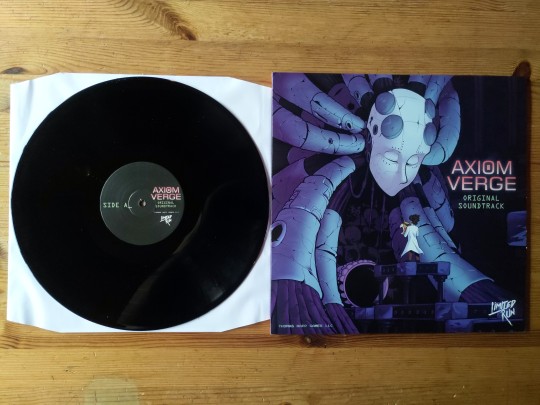

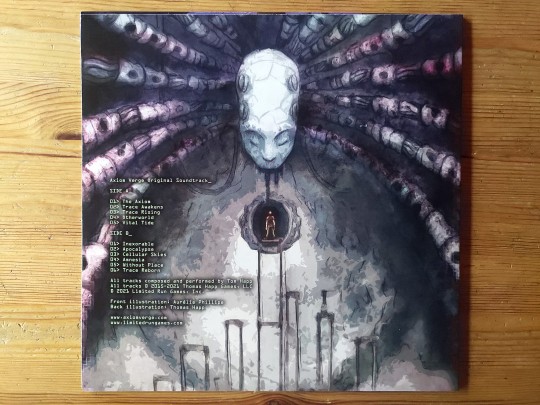
Thomas Happ - Axiom Verge Original Soundtrack | Limited Run Games | 2022 | Black
#thomas happ#axiom verge#limited run games#vinyl#black vinyl#lp#music#records#record collection#vgm#video game music#soundtrack#thomas happ games#aurélie phillipe
32 notes
·
View notes
Text
Catching the Record of Lodoss War OVAs on some channel's "animidnight" block was a formative experience for young me, and its design choices were scarred into my mind as the fundamental fantasy aesthetic. Which, uh, didn't exactly make me an odd one out anywhere because it hews closely to the ISO fantasy mold (and indeed helped make the mold).
"Record of Lodoss War" (I'm using quotes to indicate the literal phrase) is one of those odd-ball translation choices that ended up being iconic, just ever so slightly nonsensical, it stuck in the minds of kids like me that watched it young. A transliteration of the Japanese is Lodoss-tou Senki. -tou just means island; "senki" could credibly be translated as (and this may shock you) 'war record'. It's a specific term in Japanese that refers to the record an officer or attached scribe kept of the battles a military force took part in ("battle chronicle" is also a good translationand by metonymy is used for "military history"). As you might imagine, it's still popular in manga and novel names.
It started out as, not quite a novel, but a "RePlay", a record of the events of a table top RPG campaign, published in a magazine (Comptiq focused on computer games, but apparently content was content, and Lodoss got hugely popular). The mid-eighties predecessor to Critical Role, basically. It did really well, which makes sense, given that the dungeon master and the players were all published writers (the DM would publish what's called the first domestic Japanese high fantasy novels, Rune Soldier, in the same setting). It started out in D&D, but would also be played in Tunnels and Trolls and RuneQuest. In 1989, they ended up publishing their own set of rules, called Record of Lodoss War Companion, and later, Swordworld RPG (2.5edition came out in 2018!).
A series that was inspired and distilled a lot of the concepts that were and would remain popular in high fantasy settings in both Japan and America and then probably inspired another generation of iterations when the anime came back to America.
Some day maybe I'll watch the anime again, it finally got an English Blu-Ray remaster in 2017. I've read the manga and some of the novelizations in the mean time and, to be honest, they were pretty middle of the road, nostalgia notwithstanding.
Thank you for reading my ramble that was intended to be a short introduction to a short video game review.
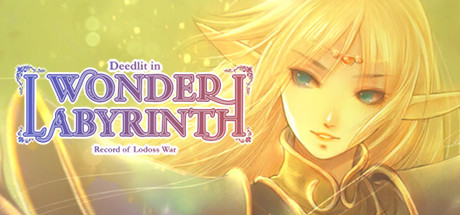
A 2D exploration platformer with RPG elements (levels, stats, different bows and weapons to equip).
Briefly: a beautiful game. No flaws, but nothing that stands out either.
This game is beautiful. If you like the pixel aesthetic at all, I think you'll also love it. Critical hit in my visual sensibilities. It looks like Symphony of the Night looks in my nostalgia painted memories. The only note: it doesn't exactly take any risks, design wise, but if it did, that wouldn't be very true to the source material would it?
The music works.
Combat is pretty fun, if a bit easy. There are seven elements, you get wind and fire options for your basic attacks, and spells and special bows for the rest. Swapping elements changes your resistances too. The different types of weapons (long sword, knife, two-handed, spear, and throwing) offer some variety, as do the attractive designs. That said, for a melee based game like this, I prefer slightly more technical and challenging combat. Hollow Knight's a good example of my sweet spot, and Blasphemous is also well in my strike zone.
Movement is basically okay. You have to feel like a badass when you leave an after image trailing behind you. The wind element comes with the ability to hover (move slowly in mid air at up to your maximum jump height above ground or water), and they do a couple fun things with that. Other than that, it's all pretty straight-forward, which is a little disappointing.
They do some fun occasional fun puzzles with the archery.
Individual room design was fun sometimes, but the overall map design was lackluster. Yet another victim of the trend where leadership says, "Adding metroidvania tag increases sales, so do it," and design can only respond, "If we take a linear game, fold the map up in a spiral, and occasionally make you back track, that makes a fun exploration experience right?" It's been done worse but it's still not great.
This sort of game tends not to have a lot of story, but what there was was pretty good. One of those cases where the writers have a "twist" in mind, but did not intend for the player to be confused about it at all, just the character. The dramatic irony still makes the pay off satisfying.
It took me about 12 hours to 100%. It's on PC for 20$, which might be worth it. The Switch and PS4 versions are full price games, which is faintly baffling for a game so short, no matter how pretty and nostalgic.
And that's why I've shared so many words with my dash over what's ultimately a decent game; because of the anchor its series dropped in my heart in childhood.
Thank you for reading.
#original#review#words#long post#record of lodoss war#steam says I've got 33 hours in it but that's because of a couple times I closed the game but steam didn't think I did#I replayed symphony of the night and super metroid recently (ugh... holy shit... a few years ago now)#to see if they held up as the gold standards of the nonlinear exploration platformers that they are in my mind#and they absolutely were; it's no wonder at all that they created a genre themselves#if only more movies and books from my childhood followed that trend#since I can't mention the 'metroidvania that shouldn't have been one' without thinking about the worst example of it:#dust an elysian tail would've been an okay beat 'em up game; adding the most lackluster 'metroidvania' elements possible just made it worse#everybody needs to take more inspiration from games like axiom verge and hollow knight#I hope tumblr's recent spurt of transmisogyny doesn't burn it down around us; where else will I be able to post this kind of nonsense?#and then ramble about it in the tags after?#after I posted this I clicked my record of lodoss war tag: it is 90% cute pictures of deedlit#and in every other one I also explain the translation of the title again 😂
4 notes
·
View notes
Text

SUBSCRIBERS EXCLUSIVE.
Power walk with me for an hour. There’s a grandfather clock chime halfway through the walk to tell you to turn around.
Keep in pace with the beats. Get less out of shape and enjoy the sights with the sounds.
Mixes start and end with high energy and get chill on the middle.
Driftlines-Willow 00:00
Active Surplus-Emote Control 04:26
The Future Sound Of London-Brujo 11:12
SUBXET-Blastoise 16:20
To Rococo Rot-tone song 19:55
Wave Temples-Visual Dream Guide to Telepathic Time Travel 22:48
Suzanne Ciani-The Fifth Wave - Water Lullaby 24:55
Higher Intelligence Agency-Ketamine Entity (Axiom Mix) 29:49
Dokun-Precession 36:44
Norken-Coast 2 Coast 44:20
Uomo Meccanico-Appartenenze 50:37
#Driftlines#Móatún 7#Active Surplus#The Future Sound Of London#SUBXET#Facade Electronics#To Rococo Rot#City Slang#Wave Temples#Suzanne Ciani#Finders Keepers Records#Higher Intelligence Agency#Axiom#Dokun#Neo Ouija#Norken#Uomo Meccanico#power walk#get less out of shape#trevlad
0 notes
Note
I hope you do acting video question livestreams on the audio book work for axioms end and truth of the divine
Oh sure, if you like! I'm recording the 3rd one soon. I think I'm allowed to tell you that...
100 notes
·
View notes
Note
Hello! Firstly, I wanted to thank you for the work you do on this blog. My mother's side is Greek and came to the US around WW2, and as I've gotten older and tried to learn about Greek culture, I've found that it's hard to find sources that aren't inundated with American pop-history. It's been really lovely being able to learn more from your blog for the past couple weeks.
Second is my question -- re: the pop history issue, I've noticed that people in the American queer community have a knack for "reclaiming" figures in history and mythology without always having an abundance of evidence for their claims. And like, I'm trans. Obviously the idea of some of things being true is cool, but it also feels disingenuous sometimes. Do you know of any good resources or books written by actual queer Greeks about either their contemporary experiences, or the history of queer people in Greece that isn't just conjecture?
Thank you again! Have a great day :)
Hello! It makes me so happy that you found my blog suitable to inform yourself on this part of your ethnic / cultural background. I hope the blog will keep being a useful source of information.
Because I am not going to lie, the way Greek history and culture, more like a snippet of it, has been almost forced into American pop culture is indeed through a disingenuous conjecture. Honestly, it's not so much a matter of accuracy per se. It's more that a niche piece of the culture has been taken and presented as almost the entirety of this culture, which eventually leads to tremendously false impressions, no matter how earnestly this niche part is explored. There is also the tendency to shape ambiguous evidence into unquestionable conviction.
I will attempt to explain why this can be a problem. Let's take the axiom - because it has reached the lengths of being treated as an axiom - "Ancient Greece was gay or Greece is gay or Greek culture was gay culture or Greece is / was a gay haven". If we really study Greek history and culture in its entirety, in a span of 3,500 years or more if we also take into acount the pre-Greek civilizations which eventually helped produce the Greek, while the existence of gay people (i.e Sappho), non-straight sexual practices (i.e erotic amphoras), ambiguous literary relationships (i.e Achilles & Patroclus?) and varied expressions of sexual desire observed especially in male deities are 100% well attested and recorded, they still comprise overall a very tiny part of the Greek civilization. Whereas it is often portrayed in western pop culture as the very essence of Greek civilization, exploration and studies of sexuality and gender identity throughout its history could amount to maybe a 1-5% of all documented knowledge associated to the Greek ethnos, its history and its legacy. Think of it this way; Greece happened to be in the epicenter of many formative achievements of humanity; spreading, contributing or improving on science, arts, extant religions and linguistics. It has been an area extremely ravaged by war because it has a very strategic position on the map. It has been in the core of three of the world's largest empires and it has been positively or negatively influential to all three (and the generator of one of them). There are so many things, struggles and achievements, to study and explore and draw from as part of your identity, that a constant foreign obsession and trivilization and sensualization of the sexual practices of people long gone eventually will start sounding disingenuous or lacking or even demeaning. Just like every individual aspires to be acknowledged and respected for more than just their sexual or gender identity (i.e skills, feelings, talents, achievements, personality), it is the exact same with culture and heritage. People want their culture to be appreciated in its entirety and not for a super niche area that is also exaggerated, if not exploited to serve foreign agendas, trends and marketing (because let's be real, not all have noble representation motives).
Okay, now I have to ask: do you know Greek? Because I can recommend you some sources, however Americans do not translate Greek works unless they are from 750 BC :)
Here's a quick heads-up:
The Greek society is a pseudopuritan society - one where people act like puritans when it comes to judging others but not at all when it comes to themselves. The gay male community has by far the biggest visibility nowadays. Lesbians come second. Other sexual orientations follow i.e bi, poly, pan. Gender (trans, non-binary, fluid etc) identities have less visibility. Asexuals also have near non-existent visibility. Most non-het non-cis people face problems in their families rather than in their studies or in urban environments. Non-cis people, especially AMAB people, might also face hardship in the workplace (like not getting easily hired).
Because the society is pseudopuritan, it tolerated and embraced and worshipped several LGBT people, except if they attempted to communicate their experience. Great composers and authors were openly gay and Greeks knew it and loved them, because they didn't explicitly involve their sexual identity in their work or because they didn't expose the pathogenies of the Greek society. If they had done that, the reception could have been different. Because of all these reasons, most of my sources will be from the perspective of gay cis men (the most visible LGBT+ community) and it will be mostly the great work and legacy they left behind, rather than their explicit documentation of the experience of living as LGBT+ in Greece.
LGBT poets and authors:
Constantine Cavafy (1863 - 1933), one of our best poets. This can be useful to you because his works are actually translated in English.
Napoleon Lapathiotis (1888 - 1944), openly gay in such times, he wrote a lot of erotic poetry.
Augoustos Korto (1979 - ), a married gay man, successful writer and activist, he has written extensively on the topics of death, depression, motherhood and love, often drawing from personal experience.
Kostas Tachtsis (1927 - 1988), poet, distinguished author and activist for gay rights during the Colonel dictatorship in the '70s. He suffered in his life and in his death as well. His murder has not been solved yet. He has written an autobiography and numerous novels with autobiographical elements. He was gay, either cross-dressing cis or maybe trans or non-cis (we don't know that back in time how exactly he identified) and had also been a sex worker for some time.
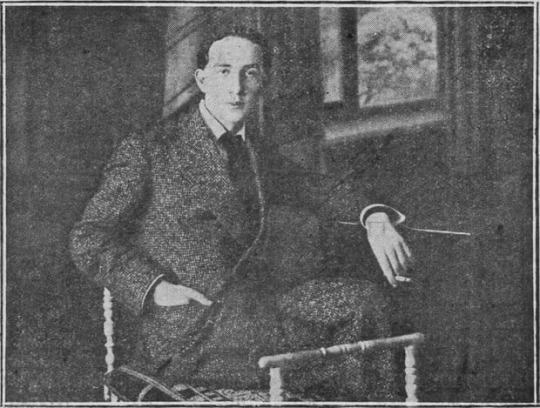
Napoleon Lapathiotis
Music:
Music won't give you direct information however it could be a way to bond with people you could connect with over similar experience.
Manos Hadjidakis (1925 - 1994), one of our two greatest composers and a rare genius, was openly yet "discreetly" gay, not out of shame but because privacy on all aspects of the human experience was absolutely essential and sacred to him. He was also an Oscar winner, although he would hate me for saying this (he threw his Oscar in the trashcan). Besides listening to his music, I would recommend watching interviews or listening to excerpts from his radio shows, because of the ease with which he could challenge anyone's intellectual capacity.
Sotiria Bellou (1921 - 1997), a lesbian or perhaps bisexual woman, she is worshipped for her unique voice, which became the ultimate symbol of the heavy-duty (underground at the time + now part of UNESCO's cultural heritage) rembetiko music genre.
TV Shows with representation:
Maestro in Blue on Netflix, a big part of the story is the romance of a gay couple suffering in oppressive families in the province
Milky Way, one of the main characters is pansexual and non-binary, and the actor is gay IRL. There is also a brief lesbian romance or a side narrative of supressed female homo- or bi- sexuality. This show will soon get in some international platform but I don't remember which one (not netflix), so keep it in mind.

Milky Way
YouTube:
There are a lot of LGBT+ people in Greek YouTube but my faves are:
ΚΡΙΜΑ by ZoePreTV: Zoe is a lesbian or bi herself (not sure but I know she's openly in a relationship with a woman) and she makes lengthy very informative quality podcasts with celebrities or everyday people, often belonging to marginalized groups, and they talk about their experiences. If you can understand Greek, this might be the best source for what you ask. I watched a fantastic episode with a trans woman and sex worker talking about her life. It is one of the greatest podcast episodes I have ever watched, hands down.
Eponimos. Zoe's best friend, who is an openly gay man, although he approaches matters of sexuality very delicately as he values his privacy a lot. He doesn't talk often about such matters (recently he did) but his channel is awesome for his lighthearted humour and the maturity of his positions. I love watching his content.
youtube
The podcast I mentioned.
LGBT+ Magazine: ANTIVIRUS. ANTIVIRUS also has this list with recent queer literature, featuring both Greek and foreign writers. Here is the link. It's in Greek though, like everything above...
Art: Yannis Tsarouhis (1910 - 1989), one of the most influential and successful Greek artists. He painted a variety of themes, he was inspired and developed Greek folk and Byzantine art, however he was also particularly notable for his love for the masculine physique and he established the classic image of the "Greek sailor" in art, theater and cinema internationally.
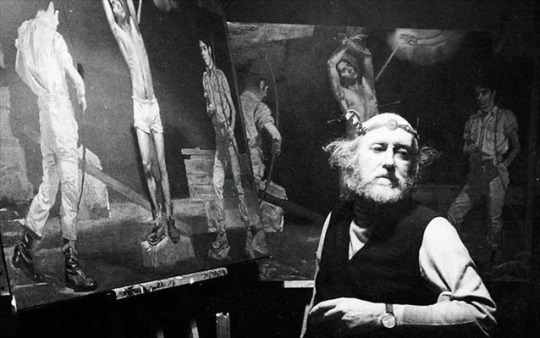
A great photo of Tsarouhis in his atelier.
I wouldn't consider myself well-versed in the topic, so I invite anyone who knows sources that could also ideally be easily accessible to the Anon, to give some recs in the comments. From my side, Anon, hopefully I was of any help.
#greece#europe#lgbt#lgbtq community#lgbtqia#queer community#representation#greek culture#discussion#anon#ask
52 notes
·
View notes
Text
On Math, Philosophy, Science and Art
Math, like any philosophy, is a lens. A lens through which we can look at reality. People may say that math is not a philosophy, but they would be wrong.
Philosophies are all lenses to look at the world with. They are each of them carved out of axioms, polished by their exploration of the emerging ideas, and peered through in order to make sense of the universe.
What makes math stand out so much from other philosophies is its sheer predictive power when used in scientific context. But fundamentally, all philosophies are predictive when used in scientific context. Many philosophies are applicable to sociology, or psychology. Math, or rather, formal logic, is just usually applied to entirely different fields of science, namely physics or chemistry, which causes the confusion about logic being a philosophy at all. But it is!
Science is to observe and interpret the world, then to record the findings. While the observation and recording is done either directly or with help from technology, the interpretation is done with help from philosophy.
This means, that science shares a lot of its makeup with art. There too, someone interprets the world, and then records something, but the record is tied closer to the interpretation than to the observation. Usually. The line between the two is blurry, and if you are a scientist, or an artist, you might have noticed that blur already.
Some of the most beautiful artistic talent i have found, i found within the elegance of a theory in physics, or the simplicity of a proof in mathematics.
Some of the most impressive record-keeping i have seen in artworks that are almost photorealistic, and that without actual photography.
73 notes
·
View notes
Text
“Philosophical and Personal Musings on the Wizard Stone and the Axiom of Proliferation” – An Essay and Divinations for Arc 3 of “The Wizard, the Witch, and the Wild One”
From the Desk of The Bard Bullseye
Happy Birthday, Worlds Beyond Number!
Spoilers abound! This is an essay discussing the actual-play podcast “The Wizard, the Witch, and the Wild One” from the fine folks at @worldsbeyondpod It is an expression of my analysis of and engagement with the content of the second arc of the show and also contains some speculation about future plot and current themes. These interpretations are my own, include some reflections on my personal philosophy, and are written in a mostly academic style of writing (be warned, it’s around 3,000 words!). If you do read through it, I hope you find my points interesting and thought-provoking regardless of whether or not any of it turns out to be true (and I have done my level best to adhere to the facts of the story thus far, with transcript pages and timestamps cited when available/applicable).
Abstract (TL;DR, or I ain’t reading all that, but I’m happy for you):
The Wizard Stone’s discovery that the Axiom of Proliferation is untrue has major implications for the overarching story and the direction of the next arc. Herein, I explore my reaction to this moment in Episode 19 and how my experience and own philosophy potentially align with Stone’s. Then, I examine the logic of her argument and its implications for the greater worldbuilding in Umora. Specifically, there is a fundamental problem with the way that wizards are using the lingua arcana that is affecting the link between the Spirit and the Mortal worlds (i.e., the “greater binding”), and this is leading to detrimental effects. This, I believe is ultimately what Grandmother Wren (and now Ame) and Coven of Elders (and possibly the Man in Black?) are concerned with, though they have come to vastly different conclusions about who is at fault and how to solve this problem, which are yet to be revealed in the forthcoming third arc (see footnote 5).
Introduction
Something has piqued my interest and scratched a deep philosophical itch for me in the second arc of “The Wizard, the Witch, and the Wild One.” While the first arc introduced the characters, explored ideas of ‘quest fever,’ and masterfully wove in lore and character motivations for reclaiming Eursulon’s sword, Wavebreaker, the second arc has expanded upon the characters and their relationship to the greater philosophy of the Citadel and Umora.
I don’t usually speculate where stories might go next or craft my own fan theories. Especially for ongoing projects (i.e. TV shows, actual plays, books in a series, etc.), I tend to be along for the ride, and I spend time analyzing the story being told and the characters within. And rarely do I put these thoughts to paper, at least not coherently; I am more likely to ramble endlessly to a friend or lurk on Discord for others’ opinions, chiming in occasionally. However, I have noticed some things brewing in this arc that I wish to discuss at-length and even speculate upon: my perspective and analysis of the philosophy of the Wizard Stone, and the possible implications for the forthcoming third arc.
I don’t often see myself in stories. Not to say that I don’t see myself or parts of myself represented in media: i.e. demographically, socially, politically, etc., but rarely do I find a specific character or character motivation that ‘snipes through the duplex door’ where I go “oh shit that’s me” or “I relate to this on a deeper level.” This happened to me in Episode 19, when Suvi is investigating the records of her mother’s early time in the Citadel: her expulsion from the College of Divination and readmittance to the College of Abjuration because she had accused one of her professors of “treason against magic itself.”
Upon her dismissal from the Citadel, Stone wrote a dissenting missive to the Archmagi of the Citadel regarding one of the three metaphysical axioms, the Axiom of Proliferation, and how this particular axiom “does not describe any actual truth of the lingua arcana, nor does it more broadly describe any facet of the greater binding” (Ep. 19, transcript p. 12). She goes on to posit that not only is it “pure intellectual technology,” but that its continued acceptance as fact is a “danger to the future of wizardry” and “[a] stain on the face of magic itself” (Ep. 19, p. 12). An axiom in this context is described as “simple… laws that are given to young wizards about broad truths of spell casting in general… that are true across spells [and], … different schools of magic” (Ep. 19, p. 13). That is, “the Axiom of Proliferation is essentially that the more times a spell is written down … the weaker the spell becomes” (Ep. 19, p. 13).
An axiom as defined in philosophy is a statement that is self-evidently true and serves as a starting point for reasoning. Therefore, any argument against its truth would call into greater question the philosophical foundation of the Citadel itself. If Stone’s claim that this was not a true axiom had not been dismissed swiftly and discredited, it is possible (though highly unlikely, given the power of empire) that this would have led to a redefinition of the philosophy of wizardry in Umora.
This is what struck me like a bolt of lighting while listening to this episode. I did almost this exact thing when I was in grad school!
Stone is… me? Faulty logic and its effects
As part of my master’s degree, I took a philosophy seminar on bioethics, which covered some polarizing subjects and more fringe points of view. Most of these topics cannot be directly studied or supported by scientific evidence, so the conversation and academic debate is largely conceptual or theoretical (i.e., conducting research to investigate these ideas have varying states of legality and moral acceptability) (see footnote 1). This course was excellent and a bit out of my comfort zone, but it challenged me to think critically about fundamental logic and accepted ideas that often go unexamined until they are taken to the extreme. At one point in the semester, we were discussing a particular topic and the current state of debate surrounding it. Immediately, I was perplexed by some of arguments made to justify it, and at first, I didn’t have the language to express why. Much like Stone, I found myself screaming (internally) “you’re all idiots!” or “you’re missing the point/the bigger picture!” or “that’s not how that works!” Essentially, I had arrived at the conclusion that if this idea were to be implemented broadly in society, it would likely have major negative ramifications, and furthermore, not even achieve the desired and purported effect that they were arguing for!
Eventually, I figured out what the underlying problem was: a logical fallacy inherent and unidentified within the current debate. Since scholars had just accepted the argument at face value and moved on, most of the debate was concerned with its future implementation or theoretical follow-on effects on individuals and society at large. I did find some existing papers that danced around the idea of fallacious reasoning (i.e., that the theoretical benefits were greatly exaggerated, if not a zero-sum game, or that the negative long-term effects may outweigh the short-term benefits), but none named it specifically or even examined the logical argument the entire debate was predicated on. So, for my term paper, I researched and wrote about this fallacy, and in it, I discussed how the discovery and acknowledgment of it would reframe the debate and perhaps even bring about reform to existing systems!
In the process of writing and researching, I felt incredibly isolated intellectually (this was also peak-COVID so that didn’t help either). Now that I had put the pieces together, it seemed quite obvious to me, but it was difficult to find supporting evidence or other similar arguments to mine (even if they weren’t breaking the logic down so specifically). Was this thing I had reasoned actually true? Why had no one pointed this out before? What if I’m wrong? What if they’re right and I’m a fool for daring to challenge them? What does my professor think? They’re an expert and approved the topic, so I know I’m not entirely off-base, but do they agree with me? I knew that if I wrote a strong, supported, and persuasive argument, that I couldn’t fail, but I deeply cared whether or not I was actually right. It was also probably one of the first times that I wrote with passion (and specific planning ahead of time!), rather than churning out yet another good-enough research paper (that I may or may not have written days ahead of the deadline or the night before).
Thankfully, unlike Stone, my fears that I would not be taken seriously, or worse, told that I was flat out wrong (and be silenced) did not come to pass—my professor agreed wholeheartedly with my argument that this fallacy is pervasive in the current literature. (Though I feel must disclaim that I still could be wrong in some other aspect of my argument, and that simply arguing the existence of a fallacy can be treacherous! In philosophy, no one ever has the only or complete answer—if they claim to, they are either lying or ignorant.) As part of the course, we did a mock peer review in class and my professor sent us further feedback on our papers after we submitted our initial draft of the term paper.
One particular piece of feedback stands out to me upon reflection and comparison to Stone’s experience and the philosophy of wizardry. It said something along the lines of ‘We think that is a very admirable and unique take on this subject. No one found any fault in your logic; however, it is important to consider the practical implications of identifying this fallacy.’ Point taken, of course, that the mere identification of a flaw in logic is not the end of the conversation—it is merely the start of a new discussion and opportunity to surface new arguments.
In my case, the identification of the fallacy was the concrete thing I felt I could verifiably yell about (academically) to explain why I disagreed so vehemently with current literature (and some truly wild propositions made by certain scholars). Of course, one should not commit the ‘fallacy fallacy,’ which is that simply pointing out a fallacy invalidates the argument. Instead, it was a means to discuss practical implications: some less harmful methods, some overlooked existing solutions, and to pull knowledge from other related disciplines that had not yet been considered because this fallacy had yet to be identified (see footnote 2).
The philosophy of Stone’s accusation of ‘treason’ and treatise to the Archmagi
In listening to and reflecting upon this episode and the conclusion of the second arc, I wonder if Stone felt similarly to me: that she had a fundamental disagreement with the way that wizards (and the Empire) conduct magic. I wonder if she learned about the Axioms and something didn't sit right with her, so she dug into the philosophy or history of it. Moreover, I find it particularly striking that her original specialization was divination. Although it has not been stated outright, I think it can be plausibly inferred that Stone divined some kind of knowledge about the fundamental ‘wrongness’ of current wizardry and the disastrous follow-on effects it would have. She may have been unable to fully convey her revelation in the moment, and so just shouted ‘treason against magic’ at her mentor. As was the case with me, the Axiom of Proliferation was just the most concrete thing that Stone could point at to explain herself.
But beyond my own biases and affinity for Stone, it follows that she may well have examined or done a proof on the Axiom of Proliferation which led to her discovery that the premise of the Axiom was false. Let’s examine the argument that Stone may have made (and the one that Suvi may have done a poor proof of, by her own admission). The argument is as follows:
All Axioms of magic describe a truth about the fundamental nature of magic
The Axiom of Proliferation states that the more times a spell is written down (proliferated), the weaker the spell becomes, which is a truth about the fundamental nature of magic.
Therefore, the Axiom of Proliferation is an Axiom of magic.
This can be simplified:
All A’s have property B
C has property B
Therefore, C is A
This does not necessarily lead to a false conclusion, and while the argument may be valid, it may not always be logically sound, see for example:
All people are mortals.
John is a mortal
Therefore, John is a person.
In the Citadel’s view, there is no flaw here, because they teach (and presume) that the Axiom of Proliferation is true in the lingua arcana. Wizards, of course, are known by their secrets, so it follows that in their philosophy of magic, they would have some kind of justification for keeping magic limited to the select few. But, if one of the premises is false (in this case, premise 2), then this justification is in jeopardy. It stands to reason that Stone must have had serious evidence to declare that premise false, and as she was studying divination, it was likely a vision or prophecy of some kind. Presuming she is correct, then it also speaks to her incredible intelligence (although she did not have the social grace at 19 years old to deftly navigate this accusation) (see footnote 3a).
Although (as far as we know), Stone did not make another public ruckus about the Axiom upon returning to the Citadel, I don’t think this caused her to abandon the belief that the axiom was erroneous. Upon her readmission, she joined the College of Abjuration, specifically studying “counterspelling, dispelling magic, [and] sort of metamagic, … the magic of magic itself” (Ep. 19, p. 11). This might seem to be an odd choice for a backup specialization, but Stone’s issue with the Axiom and metamagic are deeply intwined philosophical concepts, as metamagic is essentially the equivalent to metaphysics in our world.
Wizardry and the nature of magic in Umora
Wizards are defined in Umora to be people that can use a “language of magic” the “lingua arcana” to cast magic, and importantly, that “they believe [the lingua arcana] is the language the universe uses to understand itself,” which was only coined about 250 years prior to the present story (Ep. 19, p. 16). At the end of the first arc, Suvi discovers from her father’s notes that the reflexive indicative, which was taught to her as a necessary component of the lingua arcana, is in fact entirely unnecessary for spellcasting. And further, Stone also doesn’t use the reflexive indicative, which is demonstrated through her unique casting of Mending in the very first episode. It is unclear so far in the worldbuilding (to me, at least) if the lingua arcana is the language the universe uses to understand itself, or if it is a construct used by people to explain, communicate, and more importantly cast magic in Umora (much like math and science are ‘constructs’ that describe the nature of our world, though the fact that it is constructed does not mean it is not true). If it is the latter, then there is likely to be forces at work, be it the components of spell casting (such as the reflexive indicative), the casters themselves, or others yet to be revealed, that are manipulating and restricting the nature of magic in Umora (see footnote 3b).
Thus, I would posit that there is some issue in the way that the restriction of the lingua arcana is affecting the “greater binding,” which is “the theory of magic, that magic is the interplay between the Spirit and the Real—or the Spirit and the Mortal” (Ep. 19, p. 14). Essentially, the lingua arcana describes the nature of the relationship between the Spirit and the Mortal world, while the greater binding is the metaphysical link between them. Stone all but confirms this in her letter to the Archmagi, that if the issue is left unresolved, it would endanger the future of wizardry (Ep. 19, p. 12).
Other pertinent wizarding history and context
Stone and Soft were also part of a group called the Acadator, which was dedicated to rooting out corruption and bad actors within the Citadel. We don’t really know too much else about them, the exact specifics of their philosophy, or if they still exist as a group (given that Steel and Eiorghorain were members). There is also some history surrounding two early wizarding groups pre-Citadel, the Antivoli and the Accordati, that had a philosophical disagreement about accepting the help of the Saraz Imperium for building the Citadel (specifically related to the sharing of magic), which led to a civil war called the Cataclysm of Carrow (Ep. 19, p. 16). In terms of timeline, the lingua arcana was coined in 1423, the term ‘wizard’ was coined in 1456, the Cataclysm of Carrow was in 1467, and three years later, in 1470, the Erien (Citadel) was built. The current story with the three protagonists is taking place in 1670, so it has only been 200 years since the Citadel was created, and the lingua arcana coined only 47 years prior to that (in less than a human lifespan).
Further, the creation of the Irulian Desert, the Erien, and the Citadel is a destructive history—wizards razed a verdant forest and turned it into a hot, unlivable desert with a miles high glass tower at the center. Additionally, the Wizards of the Citadel pool their magic beneath the Erien in an ‘Aerith,’ into which they deposit magical reserves and draw upon its combined strength when in crisis (see footnote 4). Mechanically, we see Suvi ‘donate’ unused spell slots at the end of the day.
We do know that Grandmother Wren’s cottage is located on top of a source of great magical power and serves as her sanctum. Wizards also use the towers of the Citadel as their sanctums, and I believe the following is speculation, as I do not think it has been canonized yet, but it is possible that the Aerith serves a similar purpose as a source of great magical power that previously belonged to the Spirits that wizards alone now use and control. This control is the key difference that may be contributing to, or even causing, detrimental effects on the greater binding.
The Witch(es)’s and the Wild One(s)’s perspectives
Additional evidence to support this theory of the Aerith's origins and purpose comes in Episode 23, when Eursulon meets the Man in Black and discusses their opinions on mortals, particularly wizards and their desire for control. Specifically, the Man in Black states, “that tower is the handle of a knife plunged deep into the heart of this world, a heart that is responsible for… a murder to the world of Spirits” (Ep. 23, 0:09:45-0:10:07).
Later, in a flashback with Mirara and Grandmother Wren, Mirara argues that “the world has burned before” (perhaps in reference to the creation of the Irulian Desert), that “[wizards] cannot be allowed to do this thing” (still unclear what that thing is), and the coven must make some kind of decision before it is too late (Ep. 23, 0:58:46-0:59:00). Wren pleas for another option, points this out as a false dichotomy, that they must not “be forced to choose between one slaughter and another,” and they should work to find common ground and coexist (Ep. 23, 0:59:07-0:59:33). Mirara retorts that she could never imagine the day that she would see “the will of wizards debase themselves” (i.e., that wizards would ever lower themselves from their current position of power) (Ep. 23, 0:59:39-0:59:52).
Wren then asserts a key point that correlates directly with Stone’s perspective: “There is nothing I have seen in the world of Mortals or of Spirits that shows me that there is a path that is wrong to tread” or anything that proves the pursuit of wizardry as inherently wrong (i.e., the lingua arcana), only those who “tread paths hurtfully, with cruel intention” (i.e., those abusing the lingua arcana for political purposes and imperial gain) (Ep. 23, 1:00:08-1:00:28). Wren also questions Mirara’s stance of wizardry as “an abomination against the natural order of the world” (Ep. 23, 1:00:40-1:00:47). Mirara then challenges her to consider her point of view and insists that even Wren cannot deny that “the poison of wizards does not spread so quickly as to choke the life from this world” (Ep. 23, 1:01:03-1:01:09).
My pure speculation and fan theory:
From this conversation, I postulate that Mirara and the Coven has taken an extremist and doomed perspective on the harm that is resulting partially from the Axiom of Proliferation (and perhaps the Aerith as well), while Grandmother Wren took a reformist stance. This would put her and her position as the Witch of the World’s Heart at odds with whatever plan the Coven intends to enact. Given what we know of the Witch Class and the other domains of the Coven, their plan is quite possibly violent, retributive, and holds little to no concern for the Mortals or people of Umora.
The third arc will begin with Ame’s meeting with the Coven of Elders at the North Pole, where they will attempt to destroy her station as the Witch of the World’s Heart. For all of the reasons above, I believe this event will connect directly to Stone’s declaration of “treason against magic itself,” but I will just have to (patiently) wait and see (see footnote 5).
Footnotes:
(1) I am well aware that I am being quite vague and obtuse regarding this subject and what specifically I was researching. Mainly because a) that’s not really the point of these musings, this is just some background info and context to explain my philosophy which is already longer than I would like, b) it would be impossible to do justice to an overview of this complex subject in an essay about something that resonated with me in a D&D podcast (and which does not engage with that subject directly, at least not in this context), c) I’ve already written a paper on this subject and am not interested in regurgitating it here, and d) Nunya Binyess (i.e. I could still be wrong about this fallacy and I’d rather discuss WWW than start a tangential IRL philosophical or political argument on this forum).
(2) Though on a deeper level, I partially disagree with the idea that I needed to account for the practical implications of the fallacy within the paper. I disagree that when challenging the fundamental nature of something (e.g., an erroneous argument, a misinformed policy, or an unjust system), there must be an immediate remedy or solution offered up. In my philosophical opinion, once a fallacy like that is identified for something that we hold to be fundamentally true, we need to sit in that revelation and undo the thought processes created by the incorrect assumptions. You cannot flip a switch and suddenly reverse all of the justifications that have gone into supporting a flawed, ingrained argument. To undo a pervasive, incorrect fundamental idea that has been implemented, internalized, or proliferated, first it must be fully examined for all its flaws, rescinded, and only then do we start from square one and think about practical changes (in a perfect world, of course, I am fully aware that the world does not work this way). I do often wonder about this reactive nature in society to demand immediate alternatives and solutions when norms are challenged, though I recognize this is a result of different lived experiences and worldviews. After all, this reactionary nature is true in Umora as well, and the wizards of the Citadel “tend to be a lot more about praxis and practice” (Ep. 19, p. 14).
(3a) Perhaps Stone rolled a nat 20 on some kind of intelligence check for the vision, but rolled a nat 1 on her Persuasion check against Sleep!
(3b) There is another essay I could write here about the history of science and empire (another grad school course) and the reflection of this in the Imperium, its taxonomy, and the (anti)-democratization of knowledge, but perhaps another time.
(4) Something that occurred to me when piecing together the Erien and the Aerith was the similarity to Morrow’s derrick that harnessed Naram’s power in the first arc. Both serve similar purposes as well, of generating magic and magical items. It makes me wonder if it was intended for the derrick to be Morrow’s poor attempt at recreating the glory of the Citadel, or if this is just a happy coincidence/connection between the arcs.
(5) I do want to briefly acknowledge the nature of improvisational storytelling in this situation, and that anything can change, be clarified, canonized, etc. at any point. This is partly why I don’t like to speculate much myself, because I trust the creators to tell the story the way they want to and follow the paths that appear, without projecting my own hopes or prescriptions when I listen to their wonderful creation that has been crafted with such care. It is also why my theory in the end is limited to the meeting with the coven- truly anything could happen at the beginning of the next arc, and whatever I might come up with is likely less interesting than what will happen. (NB: There is nothing wrong with fan theories or head canons! It’s just not usually something that interests me!) I merely saw a connection and through-line that deeply resonated with me in this second arc and felt compelled to write about it. Also, Worlds Beyond Number and WWW is just so fucking great, and it truly astounds me that this story is so deep that I have somehow written a 12-page essay analyzing essentially a 20-minute segment of one episode. I pray to Enzo that there are no grievous errors or spelling mistakes, but I wanted to post this on WBN’s first birthday! 🧡
#worlds beyond number#worldsbeyondpod#the wizard the witch and the wild one#www spoilers#wbn spoilers#wbn#wbn pod#the wizard stone#axiom of proliferation#philosophy#fan theory#chandri newell#soft and stone#the citadel#umora#fan essay#essay writing#food for thought#critical thinking#logical fallacies#coup crew
28 notes
·
View notes
Text
The Strange Case of Amity Park
So, the facts are these:
On April 12th, 2004, Annabelle Louise Robb goes missing during morning recess at Saleham Elementary, Illinois.
“No one realized until we were taking registration after recess, and she wasn't, just wasn't there. We were all calling for her, all over the playground- the panic, the panic actually didn't set in for a while.”
It's her tenth birthday.
Seven weeks later, another young child disappears from their bedroom, just a half-mile away from Saleham Elementary. Their name is not a matter of public record.
“We all of us in the town immediately knew something was up, that this wasn't no coincidence, cos things had been happenin’ for a while, things that made no goddamn sense. We'd been paying attention see, and this whole thing didn't start with the Robb girl, though outta-towners’d been calling us crazy.”
“Actually the curfews and all that, the paranoia, that started after little J- ahem, after the second kid. The cops needed three for a pattern, but not us.”
...
Over the next three years, a further twelve children vanish from the small town of Amity Park, Illinois, all under mysterious circumstances. No suspicious figures spotted, no signs of a struggle or forced entry, and no connection between the victims - other than that none was over seventeen.
“It was misery. Pure misery. We couldn't do anything to, to protect them. They were taken from locked rooms, from crowds, anywhere. Anyone's eyes left for a second’n they'd be gone. I barely slept those years. The whole town got sick from stress.”
Listeners might label this a classic case of serial murder or kidnapping, and officially, that's what it is - an unsolved case, of an unidentified subject taking kids.
But the official account fails to tell you the complete story.
“Amity Sheriff's Office does not provide comment on cold cases, now for the last time, please simply consult the official contemporary paperwork housed in the county library. Good day.”
“You have reached the answerphone of Amity Park Public Library. Please leave your message after the tone. You have reached the a̷͓͝n̷̪̣̾́s̸̗̎w̷̧͇̍ẹ̵̄͆͜r̶̨̬̊͝ṕ̴̢̝̓ẖ̵͛o̵͍͂͠n̸̫̍̓ĕ̵̫ of Amity Park Pu̴̮͚͝b̴̙͚̋lic Library. Please leave.”
…
Here's another fact - of the fourteen taken children, nine were found, all alive. Some within days, some over a year later. Or, as locals put it, Returned. Capital ‘R’.
None of these children could, or would, talk about what had happened to them or where they'd been. Most didn't remember.
“I ain't giving you their names because they're sealed. You want a story, talk about the dead kids, their names are a matter of record.”
“Don't look for the Returned. Stay away from Them, trust me, and stay outta town too while you're at it. Now are ya gonna pay fer that or no?”
There are other facts, too, that aren't published with the lists of unfound children and redacted names.
Power outages. Outbreaks of violence. Unprecedented levels of crop disease; print and online media rolling to a total halt; a water contamination scandal. A vast and unspecific incident at local employer Axiom Labs, which left thirty dead, and families without answers.
“Sorry hon, the Axiom Thirty weren't, aren't buried here. We didn't really do burials during that time, as a town. You'd understand if you knew.”
…
On the night of August 24th, 2007, the last child vanishes from Amity Park. Daniel James Fenton, age seventeen, says goodnight to his family, and isn't in bed the next morning.
He remains missing to this day, and is presumed dead.
What exactly happened to this sleepy Midwestern town in the mid-noughts? Why has such a dramatic, tragic case been so withheld from the American consciousness? And what can we learn from the way the town responded to this trauma: its unnerving slip into superstition, ritual, and secrecy?
“What, you never seen blood blossoms before? I don't care if you got an allergy, you either sniff the flowers or you stay outside. And besides, ain't you [redacted]’s cousin? Did he not explain all this already? Look, jus’- wait, are you recording me?”
…
Welcome, to The Strange Case of Amity Park.
#danny phantom#dp#dp fanfic#fanfiction#my fanfiction#podcast fic#cw mild horror#cw kidnapping#may not have the energy to ever write this sprawling au but i can sure write a snippet that lacks any context
23 notes
·
View notes
Text

timekeeper nputs: requested by anon.

Amargo. Amser. Ambrose. Eterna. Chrono. Patience. Sundial. Nox. Equinox. Paradox. Axiom. Loop. Clock. Clepsydra. Hour. Gnomon. Metronome. Clockwork. Aeon. Eon. Arius. Neo. Tempo. Alula. Delano. Day. Rhythm. Adagio. Elapse. Orrery.

Time times. Keep keepers. Day days. Night nights. Sec second. Min minute. Hou hour. Watch watches. Pocket watch. Time piece. Timepiece timepieces. Elap elapsed. Chrono logical. Chronologic Chronological. Speed speeds. Dial dials. Pen pendulum. Con continue. Eter eternal. Fut future. Past pasts. Pres present. Never nevers. All always.

Chronology. Time-watcher. Timezones. Equinox. Nanosecond. Opportune. Patience. Grandfather-clock. Timepiece. Stopwatch. Pocket-watch. Timewise. Sometime. Elapsed. Synchrony. Synchronous. Hypertime. Eigentime. Timescape. Morning-time. Day-time. Night-time. Dawn-time.

The keeper of time. The one that watches the clock. Your personal timepiece. The watcher of the clock. The hands of a clock. The inevitable. The passing time. The time passed. The past, present, and future. The one who is eternal. The one that records time. The one with memories of all.
#timekeeper#timekeeper theme#name help#npt ideas#npt list#neoprns#neopronoun help#name inspo#nput#npt#neopronouns#name ideas#name list#name suggestions#pronoun list#pronoun suggestions#pronoun ideas#usernames#username ideas#title ideas#title suggestions#title list#title inspo#🎀 ✦ life is filled with vanity#🌸 ✦ just awake : michael ,he him#nputs
41 notes
·
View notes
Text
The Dress - Oneshot
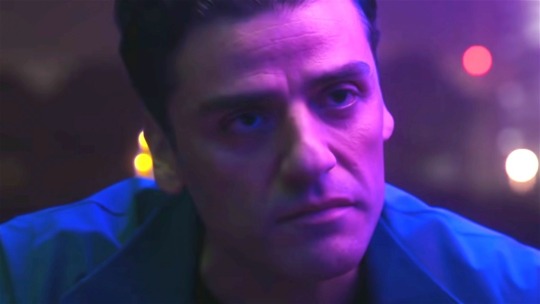
Pairing: Marc Spector x Reader, Steven Grant x Reader (mentioned not shown)
Word Count: 3.1k
Summary: Marc should quit smoking and overthinking all the time.
A/N: Stole a quote from Sally Rooney's Conversations with Friends, I really overanalyzed those few lines and then I flipped the page and felt absolutely betrayed so this is what I wrote. Lines are bolded down below In typical fashion, nothing happens here. Don't smoke kids, it's not good for you.
I don't own photos, dividers or characters.

It was one of those rare days, where you’d managed to convince him to stay in bed with you for the whole day, waking up from naps for a few minutes of lazy kissing before drifting off into the next one. You’d suspected Steven also had something to do with it, probably threatening to take the body if Marc didn’t take you up on your offer. His eyes had drifted over to the screen of your phone when you were pleading with him, and he’d given in with a curt nod, methodically getting into bed with you, decompressing and melting like ice cream as his muscles became loose and relaxed.
You’d crawled in then, twisting yourself around him until you weren’t sure where you began and where he ended. You loved it like this, Steven did too, and Marc did as well, though he always grumbled about it. About going soft.
Soft jazz and creamy vocals filter in through the air hanging around you and Marc from the record player in the corner of the room. His fingers are trailing up and down the line of your spine, his legs intertwined with yours, a cigarette dangling in his free hand. The window is open and the curtains flutter from the breeze that whisks the smoke away from your nose.
You lean up and take the cigarette from his mouth. He mumbles a hey in a protest that he really doesn’t mean, while you take a small breath in and place it back where it was, slowly blowing out the smoke. A thought rises in your head, and as you sift through it, deciding if it was worth voicing or not, you start tracing shapes on his chest through his shirt, peppering moth-like kisses on his neck.
A low hum bubbles up from his throat as he shifts underneath you, stubbing out the cigarette in an ashtray on the bedside table, and murmuring, “Stop it, tickles.” You stop accordingly, pushing yourself up to press the tip of your nose against his cheek, kissing that same spot moments later.
Having mulled over the thought enough, and since you were so close to his ear, you whisper, “If you look at love as something other than an interpersonal phenomenon-”
“Jesus, woman,” he scoffs, but the love is still dripping from his voice, wrapping around you and holding you safe and warm. “Way to kill the mood,” a couple of moments pass in silence, and when he sees that you have no intention of continuing, he kisses the crown of your head, pulling you closer into him, wrapping his arms tightly around you.
You pick up where you left off, “And try to understand it as a social value system.” He hums in acknowledgement, letting you know that he’s listening and that you can and should keep going. “It’s both antithetical to capitalism, in that it challenges the axiom of selfishness, which dictates the whole logic of inequality.”
He goes quiet for a few minutes, the record spinning to a stop, and a cooler draft blowing into the room, making goosebumps rise on your skin. Marc, saying nothing, pulls the duvet on top of your shoulders, knowing better than to suggest closing the window. Finally you mumble, “Sorry for killing your mood.”
“Don’t apologize,” Marc always thinks loudly, you’ve told him time and time again. When he goes quiet like that, you don’t take it personally, knowing that the synapses are lighting up like fireworks in his mind, eyes darting back and forth as his teeth rub together. You lean up and ease the muscle hinge of his jaw, and he catches your eyes. “You’re saying I’m better than capitalism?”
That wasn’t what you wanted to say, but you weren’t sure anymore what your original intentions were when you started talking. “I guess so, yeah,” You pause for a moment, wrapping one of his curls around your finger and letting it bounce back into place. Gently, you trace the circles underneath his eyes with your fingers, as your ideas click into each other like puzzle pieces. “No, I’m saying we’ve defeated capitalism together.”
He snorts, a teasing smile on his face as he turns and presses a kiss to the palm of your hand, letting you know that he likes it, that you should stay where you are. “That’s a pretty fucking low bar, comparing what we have to capitalism.”
“Well-” You latch on to the end part of his sentence, the words he surely didn’t mean to speak out loud, the hidden meaning he didn’t want to mean. Those three words turn over and over again in your mind, dissecting them, rearranging them for any and all enigmatic emotions of his that he may have stowed away from you. “What do we have, Marc?”
“Capitalism’s fuckin’ ugly,” it makes your heart drop a little, that his answer is so obviously defensive and terrified. For a brief moment, you want to pull away from him, to get ready and head out the door to go get some groceries you don’t need. The moment passes and the guilt crawls in, so instead, you take his hand in yours and intertwine your fingers together, bringing it to your mouth to kiss each bruised knuckle individually.
“There’s a lot of ugly things in the world.” He hums in agreement, his hand slipping under the blanket and coming to rest on the side of your thigh, his thumb rubbing your skin back and forth. Your flutter closed, wondering how he knew what Steven does to you to get you to calm down. “But I still managed to find you.”
When Marc doesn’t reply, body going minisculely stiff in your arms, you go back to the topic at hand. Though you love Steven with all your heart, you don’t want him to front now, what usually happens when Marc overthinks. These are words you want Marc to hear, the man who got you tulips for your first date, then bought you roses on the way back to your apartment after dinner. “It’s more than just capitalism, and defeating it. Marc, you’ve made me your equal.”
He murmurs your name, making you catch his eyes again, “You know what I think?” He smooths his hand on the side of your head, his other still firmly grasped in yours, and comes to rest at the back of your head. “I think I shouldn’t let you smoke, you turn into Plato.”
Smiling, you nudge your nose against his, sighing, “I’ll stop when you will.”
“Alright then, baby,” you hear the smile curling around his voice, like a cat’s tail, soft and purring. You decided it’s a nice sound, and want to make him talk like that more, that it brings you almost as much joy and calm as it does him. “I’ll quit tomorrow.”
He doesn’t mean it, you know that. It’s the tenth time he’s told you he’s quitting in a little more than a week. You want to keep badgering him about it, maybe guilt him into thinking about the day where he’s going to leave you all by yourself, with not even Steven to keep you company. But you know Steven will take care of that, maybe he’s even doing it now. You’re going to bloody kill yourself, Marc. Your eyes drift over to the mirror on your vanity table. Steven will probably give you a good scolding as well, telling you that you’re encouraging Marc and killing yourself, breath-by-breath.
You look at Marc again, and the line between his eyebrows, the one that only shows when Steven is talking to him, is absent, his eyes still firmly planted on you. Maybe Steven realized that as well, that Marc is finally at ease for the first time in years, that now was not the time to squabble back and forth about cigarettes.
Shifting underneath you, he grabs the cigarette pack and a lighter, not letting go of your hand as he shakes one out and nudges it between his lips. Before he gets a chance to light it, you take the lighter from him and do it for him. He mumbles his thanks as he sighs out, eyes falling shut. In response, you kiss the crease of his elbow, where the skin is soft and sensitive.
“M’serious,” he says quietly, taking it between his fingers, smoke billowing out with each word. “I’ll quit tomorrow. Once I finish this pack, I’ll stop buying them and throw away my matches.” You murmur unintelligently, feeling another nap falling on you. He frowns down at you, squeezing your hand and your eyes focus back on him. “You don’t believe me.”
“It doesn’t matter if I do,” you give him a half-hearted smile with all of your soul, your hand cupping the side of his face.
He tilts his head, tapping some ash to the side, keeping the cigarette dangling between his fingers, “It does,” he murmurs, almost in shock that he’s saying this, wondering why. “It does fucking matter to me that you believe me.” It’s said with such conviction that goosebumps pebble on his skin, and he shivers with the intensity of the feeling washing over him.
Roaming his face with your eyes, you sit up a little and reach for the cigarette, and bring it to your lips, inhaling. Once you’re done, you place it between his fingers again, kissing his cheek, pulling a blanket from the side of the bed on top of him, tucking it around him as best you can. You feel his eyes on you, tracing your every movement, probably hoping that you’ll tell him you believe him, that you’re proud of him for wanting to quit, to better his health for you and Steven.
So you murmur, “Would it make you happy if I said I believed you?”
The cigarette has burned out until now, and he stubs it out, the corners of his mouth turned down, “Doesn’t matter now, even if you did. It’s obvious that you don’t.”
“Marc,” when he doesn’t look at you, you push him down on his back and throw your legs over his hips, grasping his face between your hands so he does. “I’ll love you regardless. And I don’t want to pressure you.”
His eyes soften at that, and he slips his hand underneath your shirt, rubbing in small circles at the back of your hips, “So you believe me?”
“In a way, I guess,” you smile and kiss him softly. It’s tender and gentle and it makes your heart hurt in a way that you don’t want to admit, but you do regardless. Marc bruises your heart sometimes, sending Steven to kiss them away. When you pull back you push back the curls on his forehead, “You’ll take me to the ocean tomorrow?”
He wants to tell you that you don’t need to ask, that the question is ironic. You could ask him to shift the tectonic plates and he’d die trying, his body crushed between underwater stones, falling piece-by-piece to the salt water, never to see the light of day again. He doesn't tell you all this, knows that it’s one of those things that would scare you away, make Steven go, Marc, you bastard, now look at what you did. Steven must notice the thoughts running in his mind, because he suddenly appears in the vanity mirror as a warning, a yellow light.
So, instead, he thinks of the way you looked when he took you to the park and you’d cooed and coddled any baby or dog you’d seen. “Will you wear that dress I like so much?”
“The yellow one with the flowers?” He hums, trying not to act surprised at how well you know him. Trying not to think about the fact of how transparent his face must have been that day in the park, how you had picked up on it without him ever actually mentioning that he liked that dress until now.
You purse your lips to the side teasingly, and he melts into the ground at the adorable sight. He wonders if you’re aware of his will power and how it lays in the palm of your hand. Your voice calls him out of his thoughts, eyes teasing, “I thought you liked me most without any clothes on,”
It comforts him to know that you can’t read his thoughts. That he can think about the severity of his feelings for you without feeling exposed, of becoming vulnerable before he wants to, to the possibility of rejection. “Ha ha,” he deadpans, but regardless, he slips his hands out from underneath your shirt, resting them on your thighs. He’s sure he looks like an idiot right now, just staring at you like a creep.
“I’ll wear it,” you grin at him, clearly pleased with something you’ve seen on his face, or in his eyes. So pleased in fact, that you press your lips on his chin, lingering there for a few moments and sealing his heart to yours unknowingly.
Still, heat rises to his face, scared that he’s overstepped a boundary in some way after making a manipulative and demanding request, “Only if you want to. Don’t because of me.”
“I do want to. Because of you,” his stomach drops just a little, the very thing he’d been dreading molding and taking form in front of his very eyes. For a moment he considers letting Steven front, to fix his egregious mistake, put him in timeout until he learns how to talk to a woman properly, without sounding like an outdated dick. But a quick glance at the mirror lets him know that Steven is not here, not willing to take over, leaving Marc, inadequate and blundering, to fix his mistake.
He swallows down the sandpaper in his throat, thinking about what Steven would do if he was here. Nothing comes to his mind, and he has a sudden, urgent feeling that if he doesn’t speak soon, the damage would be irreparable. But you’re still sitting in his lap, humming softly and musing about what to take for lunch tomorrow, tracing his collarbone. His head spins and hurts, not knowing where to begin, he says the first thing that comes to mind, “I’ll take you regardless. Dress or no dress.”
“I know,” your eyes catch his, stealing his breath away. They’re teasing and light, no hint of betrayal lies within them. You lean forward and card your fingers in his hair, scratching his scalp and making him go cross-eyed. Laughing he hears you say, “And I’ll wear it.”
“But-”
You lean forward and kiss him quiet, pulling back to murmur, “I won’t wear it for you, I’ll wear it for me.”
His heart rests for a few moments, glad that it’s been all cleared up. So, his hands come and press into your shoulder blades, bringing the both of you lying down on the bed. Going through the familiar motions of arranging the sheets and duvet and blankets the way you like, he murmurs, “Good, good, baby.”
“I’m doing it to make you happy, because I know how much you like that dress,” his lungs stop mid breath, and he starts pleading for Steven to take over, to come out of whatever hole he’s hiding in because Marc can’t seem to make anything better when it comes to talking to you. “And making you happy makes me happy, so I am doing it for me.”
Marc is ready to cry. He’s not sure what to think anymore, from the way you so simply imply that his happiness is just as important as yours, as if he could ever live up to your levels, and the way that, despite everything and all your reassurances, it still seems a little fucked up that he’s blackmailing you into wearing something he likes, so he’ll take you somewhere you like.
He tells you this, and you just laugh, pulling away from his embrace to push the curls out of his forehead, so he can see you clearly though they just bounce back to where they were, having a mind of their own. The pout that flashes across your face turns his insides into goo, his limbs having morphed with the floral sheets underneath him.
“So?” you smile at him, kissing the space above and below his lips with a small giggle, you must have known not to expect a reply from him when he’s in this state. “So, what if it’s fucked up?”
He has effectively no response for that in his mind so he shrugs, “Doesn’t feel right, s’all.”
“Why?” You’re tracing his hairline, expression soft and domestic and everything he’s ever wanted in his life. “Aren’t I your equal, Marc?”
“‘Course you are,” he confirms back it like it’s the only truth he’s ever known. That his life would be meaningless without it. In many ways it would. He’s just glad that you’ve realized how much he needs you in his life, that a world where he wasn’t your equal wasn’t a world that had meaning for him.
And if you’d figured that out through some half-asleep murmurings, bashing capitalism to its very axiom, then so be it. He murmurs it again, once more for himself, “‘Course you are.”
“And you’ll take me to the ocean tomorrow?”
He tells you that you didn’t have to ask, that you could demand it from him and he would do so in a heartbeat.
“Just like you did with the dress?” you’re smiling from ear-to-ear, having caught him in his own trap. “Marc,” you murmur before he can think anymore about it. “Marc, you don’t have to ask me to wear what you like, or make you a cup of tea, or anything else. Not when you and I are on the same stage in the world, when you’re just as important to me as I am to myself.”
Marc decides that he likes that idea, that he’ll take you to the ocean tomorrow with no fuss, and that maybe, just maybe, he can handle things almost as well as Steven can. His mind drifts off to a probable future, he hopes, when, or if, he’d manage to give you a baby of your own, a dog as well.
Though he’s more of a cat person, a dog would work better with the fish.

Thanks for reading! Part 2 here!
#marc spector#marc spector x reader#marc spector x you#marc spector x y/n#marc spector x female!reader#marc spector fluff#marc spector angst#marc spector fanfiction#marc spector fanfic#marc spector fic#marc spector x f!reader#marc spector imagine#steven grant#steven grant x reader#steven grant x you#steven grant x female!reader#moon knight fanfiction#moon knight#moon knight imagine#moon knight fic#oscar isaac
692 notes
·
View notes
Text
Excerpts from Edward Said's The Essential Terrorist, a review of the 1986 book Terrorism: How the West Can Win by Benjamin Netanyahu
This brings us to the book at hand, Terrorism: How the West Can Win, edited and with commentary, weedlike in its proliferation, by Benjamin Netanyahu, the Israeli ambassador to the United Nations. A compilation of essays by forty or so of the usual suspects–George Shultz, Jeane Kirkpatrick, Lord Chalfont, Claire Sterling, Arthur Goldberg, Midge Decter, Paul Johnson, Edwin Meese 3d, Jean-Francois Revel, Jack Kemp, Paul Laxalt, Leszek Kolakowski, etc.–Terrorism is the record of a conference held two years ago at the Jonathan Institute in Washington, Jonathan Netanyahu being Benjamin’s brother, the only Israeli casualty of the famous raid on Entebbe in 1976. (It is worth noting that victims of “terrorism” like Netanyahu and Leon Klinghoffer get institutes and foundations named for them, to say nothing of enormous press attention, whereas Arabs, Moslems and other nonwhites who die “collaterally” just die, uncounted, unmourned, unacknowledged by “us.”)
[...]
In fact, Terrorism: How the West Can Win is a book about contemporary American policy on only one level. It is equally a book about contemporary Israel, as represented by its most unyielding and unattractive voices. An attentive reader will surely be alerted to the book’s agenda from the outset, when Netanyahu, an obsessive if there ever was one, asserts that modern terrorism emanates from “two movements that have assumed international prominence in the second half of the twentieth century, communist totalitarianism and Islamic (and Arab) radicalism.” Later this is interpreted to mean, essentially, the K.G.B. and the Palestine Liberation Organization, the former much less than the latter, which Netanyahu connects with all nonwhite, non-European anticolonial movements, whose barbarism is in stark contrast to the nobility and purity of the Judeo-Christian freedom fighters he supports.
Unlike the wimps who have merely condemned terrorism without defining it, Netanyahu bravely ventures a definition: “terrorism” he says, “is the deliberate and systematic murder, maiming, and menacing of the innocent to inspire fear for political purposes.” But this powerful philosophic formulation is as flawed as all the other definitions, not only because it is vague about exceptions and limits but because its application and interpretation in Netanyahu’s book depend a priori on a single axiom: “we’ are never terrorists; it’s the Moslems, Arabs and Communists who are.
[...]
Certainly Israeli violence against Palestinians has always been incomparably greater in scale and damage. But the tragically fixated attitude toward ‘armed struggle’ conducted from exile and the relative neglect of mass political action and organization inside Palestine exposed the Palestinian movement, by the early 1970s, to a far superior Israeli military and propaganda system, which magnified Palestinian violence out of proportion to the reality. By the end of the decade, Israel had co-opted US policy, cynically exploited Jewish fears of another Holocaust, and stirred up latent Judeo-Christian sentiments against Islam.
[...]
For the main thing is to isolate your enemy from time, from causality, from prior action, and thereby to portray him or her as ontologically and gratuitously interested in wreaking havoc for its own sake. Thus if you can show that Libyans, Moslems, Palestinians and Arabs, generally speaking, have no reality except that which tautologically confirms their terrorist essence as Libyans, Moslems, Palestinians and Arabs, you can go on to attack them and their ‘terrorist’ states generally, and avoid all questions about your own behavior or about your share in their present fate.”
#the essential terrorist#edward said#edward w. said#benjamin netanyahu#terrorism#terrorism how the west can win#israel#i read this on blaming the victims earlier this year and idk that this has been circulated on tumblr much. glad it's in The Nation website!#zionism#post
15 notes
·
View notes
Photo


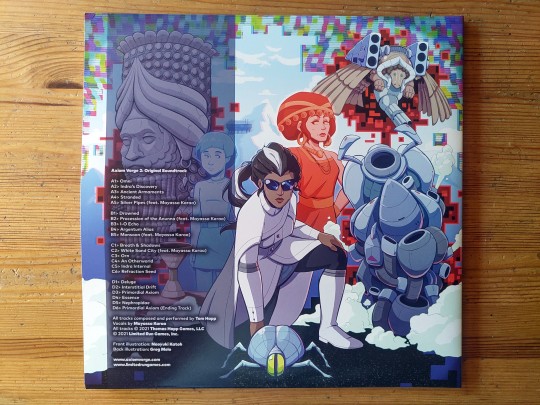

Thomas Happ - Axiom Verge 2 Original Soundtrack | Limited Run Games | 2022 | Black
#thomas happ#axiom verge 2#limited run games#vinyl#black vinyl#lp#music#records#record collection#vgm#video game music#soundtrack#thomas happ games#axiom verge#greg melo#naoyuki kato
16 notes
·
View notes
Note
Firstly, can I say thank you for all your GO meta. I've spent much of my insomnia soaked night reading through your musings and the replies, and almost all of what I've read makes so much sense to me.
There is a question, honestly, but first..
I read GO when it first came out, and have probably been an avid Terry Pratchett and Neil Gaiman fan for longer than many fans have been alive. Loved the book, adored the first series, found myself completely floored by S2. The last 15 is probably. - no that's wrong, Definitely - the most beautiful, tragic, heart wrenching scene I've ever encountered. Realising what just broke you was played out by two middle aged, straight actors but all you've seen are two beings whose universe is each other and who are being ripped apart by what they are feeling. I don't have the words, I really don't. Sublime acting & writing.
My response surprised me, I couldn't let it go and I worried at it like a (small, red eyed) dog with a bone. Then I found Tumblr and realised I was far from alone. I've read all the theories and a fair bit of fan fiction (re Michael Sheen, "I love that the fans write their own stories, even if most of them involve David & I having sex"). Some of the POV resonate some don't. Yours do much more than most.
After all that, mine isn't a huge question, it's just a niggle I have. Maggie. Something doesn't feel right there and I wondered if she had set anything off on your radar? Given that NOTHING is accidental in a Gaiman story..
Maggie can't spell and it was highlighted. UGRENCY. (T.O.S.T.E, and Angle anyone) Maggie doesn't eat, though she loves a skinny latte, and doesn't drink alcohol. Claims the record shop is failing, but sends a pub in Edinburgh music for their jukebox? She was never a teenager, and whilst claiming to be tired of being scared is completely fearless. Won't leave Az on his own, is unfazed by demons and doesn't question what Cr & Az are, unlike Nina.
I'm not sure where I'm going with it, but something is off and I wondered if you had any thoughts?
Ok, enough, I'll stop rambling and step out of your questions now. Thank you for bearing with me if you made it this far.
First I just want to acknowledge and validate your adoration for Good Omens! This fandom exists For Reasons! Cheers, and thank you for your ask.
I've seen other folks wondering what you're wondering about Maggie; you're definitely not alone. For the little it's worth, I don't actually think she's ethereal or occult. I think she's a human being with some quirks. (I also can't agree with "doesn't eat" -- we don't see her eat, and she doesn't accept Aziraphale's offer of an Eccles cake, but the former is likely happenstance and the latter, well, I wouldn't accept an Eccles cake either if I had just taken such a giant monetary gift from someone. It's just too much; I'd feel that I was taking advantage and not being properly grateful.)
I actually don't drink alcohol, and I assure you I'm fully 100% no-question-about-it human. (Though there are those who would say I'm more than slightly demonic.) I had an alcoholic parent, which shaped my young life in some not-amazing ways, and I never understood how they got to be that way, so I decided to stay safe and just... not try drinking.
When I got older and more confident in my ability to steer clear of alcoholism, I tried a bit of wine and a bit of brandy and a bit of other thises and thats and discovered that I plain old didn't like them! So I drink non-alcoholic cocktails (I love this fashion! N/A cocktails can be creative and tasty!) and locally-made sodas and if that makes me weird, okay, I'm weird. It doesn't make me an angel. Doesn't even make me a "better" (whatever that is) person -- it's morally neutral. It just is.
(I'm not a skinny-latte person, though, in case you were wondering whether I'm Maggie. Chai is my coffeeshop preference.)
A thematic reason I think Maggie is human has to do with an extension of the Good Omens axiom that Heaven and Hell are just names for sides. Demons, angels, a vulnerability or a trick more or less and other than that they're basically the same. I want to believe that in the GOverse, that's true of humans too -- we have more in common with angels and demons than anyone cares to admit, despite the difference in lifespan and our superior inventiveness. Possibly including quirkiness!
I want this to be true because it means Crowley and Aziraphale needn't be lonely together on Earth even if Heaven and Hell do finally chuck them out for good. I want this to be true because it adds some intriguing resonance to a Second Coming of Jesus story. I want it to be true because I want Good Omens to keep saying go-be-properly-good to humanity.
I could be wrong, of course. I've had several of my headcanons contradicted by Word of Gaiman already, barely a month after s2 came out. I'm sure more will go the way of the dodo, and there are a few things I've said that I don't actually believe any more myself.
But I want Maggie to be human because I like her. I like her shy awkward approach to Nina. I like her willingness to explain How To Human When You're Crying to Aziraphale without shaming him for not knowing. I like her loyalty to her benefactor, which she doesn't trumpet but which is brave as all get-out when the demons show up. I like her flipping the bird at the demons, creatively defending the bookshop, standing up to Shax, giving Nina space to work things out.
Sometimes we humans are okay, you know?
34 notes
·
View notes
Text
Chapter 204 Trivia
What we thought may be a politics arc may in fact become a brotherly feud…

Galileo's quote is taken from his book "The Assayer", considered to be one of the pioneering works of the scientific method. At the time, most science was done by philosophical arguments rather than observation and trying to understand the mathematics behind them.


Math is the universal language because the symbols may change, but the meanings/axioms cannot. Because of this, the cover of the Golden Record placed on Voyager 1 (the probe leaving our solar system) has instructions written in math in the hopes some future beings can understand.
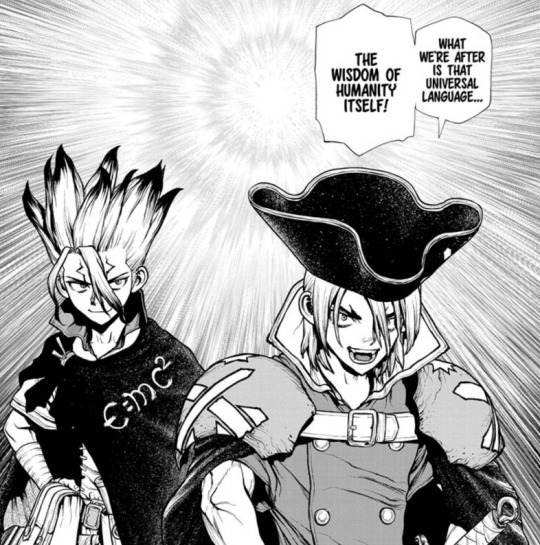

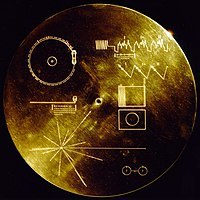
Ryusui wasn't wearing two swords last chapter, I wonder where they came from and why he's wearing them now…
(Maybe this is why Sai was running from him haha!)
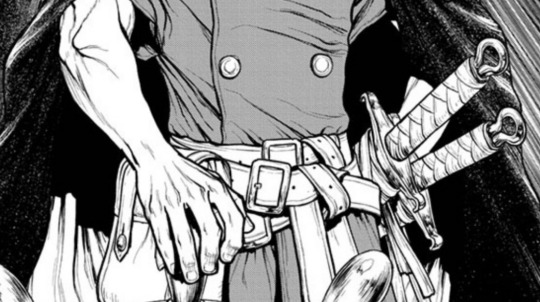
Mathematical errors have ruined a lot of space missions: the Mariner 1 was destroyed because of a missing hyphen, and the Mars Climate Orbiter was destroyed on landing because of a failure to convert units.
Avoiding these errors was very difficult when it was all done by hand.
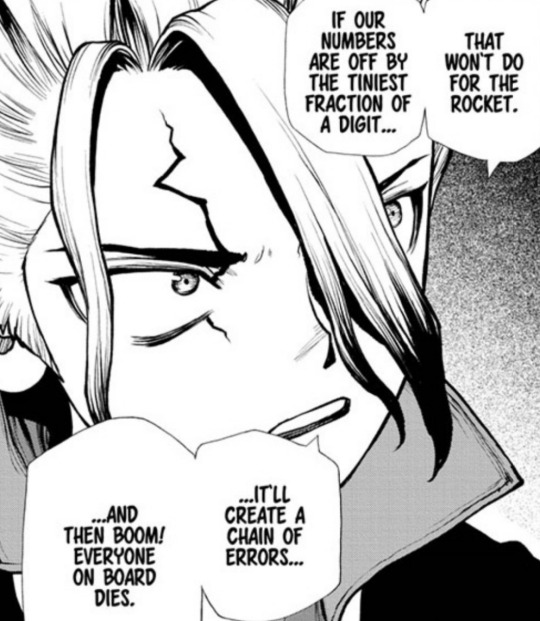

This seems to be at least partially true, however the practice has lessened over the decades. Indian-educated parents and grandparents may remember, but students these days probably only need to learn up to 19x19!
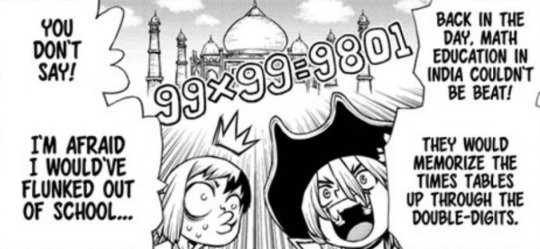
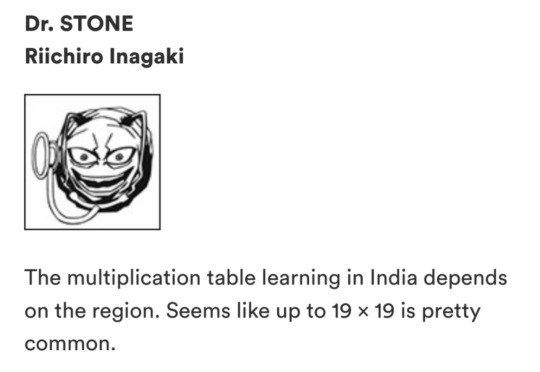
The HR industry in India is incredibly large, and are a very useful resource to have for any business looking to scale up. It's not surprising that the Nanami Corporation set up a university there!
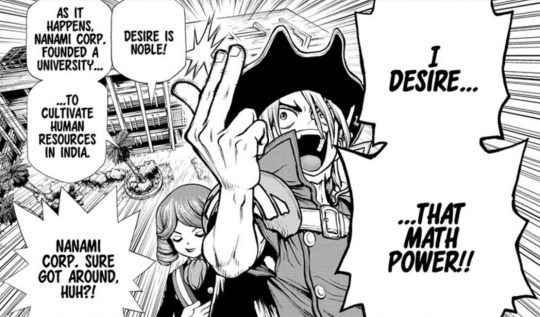
Sai appears to be the 554th most popular name in India and can be used for both genders, but it's generally a male name.
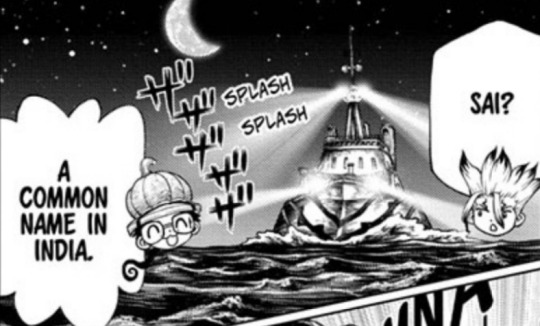
The equations in the background here I haven't identified yet, but the gamma (γ) thrust here may be alluding to the thrust equation used with rocket engines in space. The gamma is the specific heat ratio of the gas.


The day is October 1st, so the team likely left Spain sometime between September 15th-20th if it did in fact take them 10 days to travel the distance (with some delays because of the Suez situation).
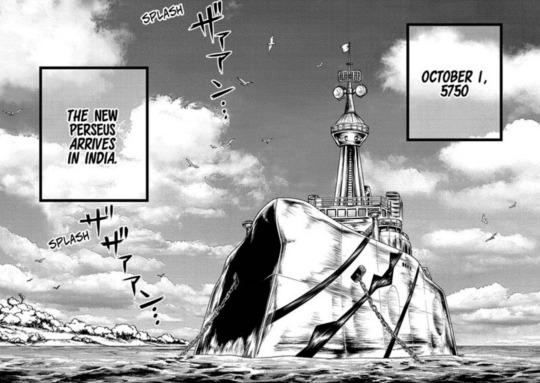
The food here may be a somewhat generic curry as the sound effect seems to indicate, or it could also be lamb gosht based on the color, region, and spices used.

Technically we don't know that Ruri specifically called for the defensive positions, but we do know everyone in Japan is probably in them.
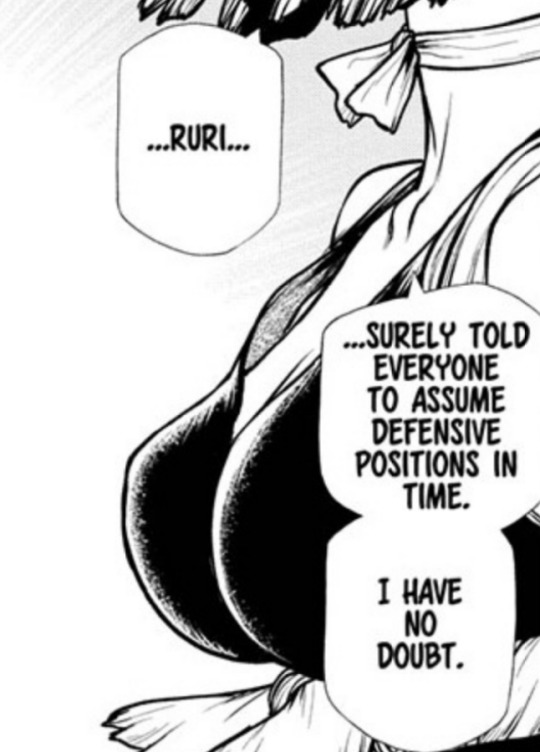
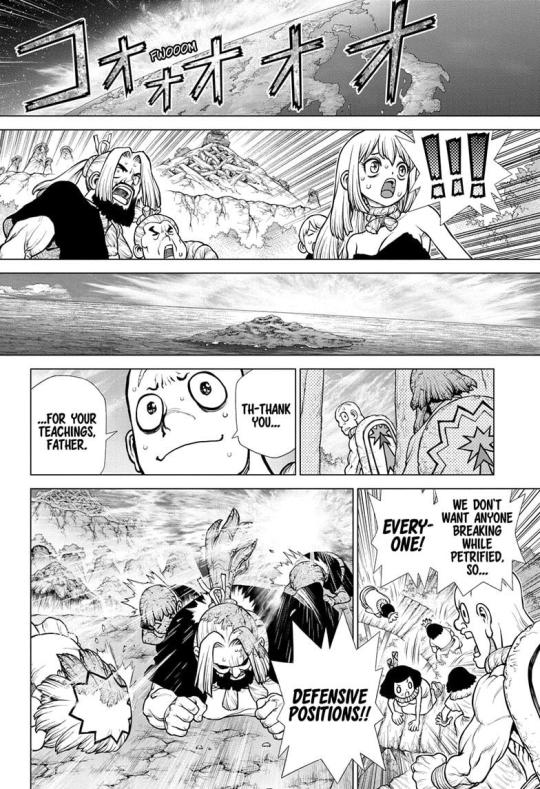
I think this is the same sky image as the one Tsukasa saw in chapter 188, but with a different star pattern.
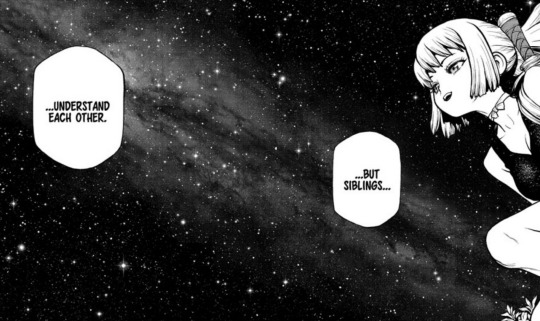
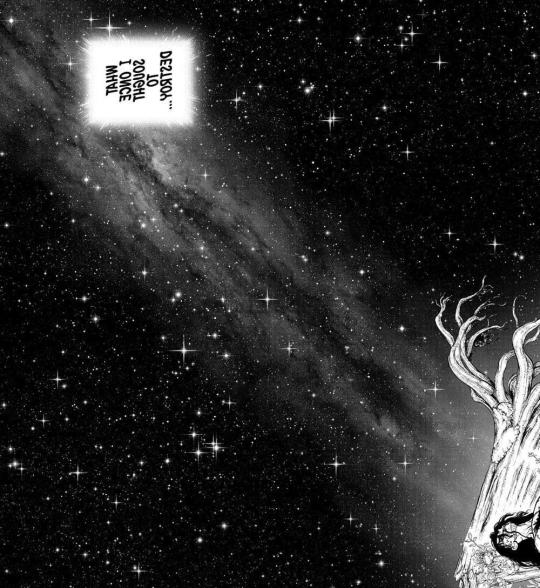
The Fellenius method and what Senku is actually doing here is dividing the slopes into segments and calculating how stable each one is using the properties of the dirt and rock. Putting the segments together should give you how likely a rock slide is. Strata are layers of rock.


The many-armed pose Sai is found in is a reference to Durga, a major Hindu deity. She is associated with protection, strength, motherhood, destruction and wars.


This comment I believe is Chelsea's from the "I'm not a fan" part, with the "baaad" learnt from Chrome's habit.
The meaning of her comment is confusing, but it might be because the last pretty-boy character introduced was a villain (Stanley), however shes also a fan of Hyoga…?


Sai's outfit is very simple and rather lacking compared to Ryusui's, however they share elements such as the collar type and addition of a belt.
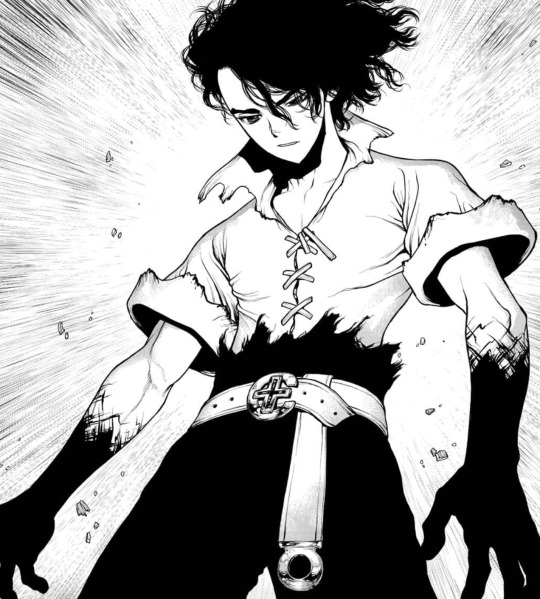
The belt buckle is very interesting, it doesn't follow Ryusui's nor Nanami Corp.'s branding and looks like a C+.
My guesses for the meaning:
-C+, the programming language, based off the fact he was petrified on his laptop presumably.
-C, the Roman numeral, indicating 100+ because of the million-times brainpower comment (million in Japanese is 百万, 百=100).
-C, from E=mc^2, for light speed.
Sai's odd yell ("peegyaaaah!") may be a computer joke, as the sound effect "ピ" (pi) tends to be used for computer beeps, like pressing a button.
A similar sound has been used in the past for Xeno's encryption device.

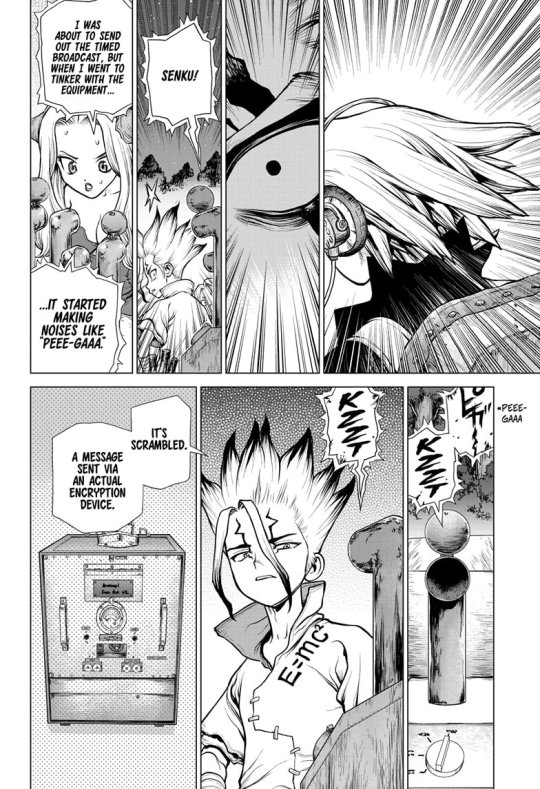
Sai's character could go a lot of directions since he's unlikely to be one of the traditional nerds they described, nor one like Joel since Joel exists. What Ryusui did to scare off his older brother though, I'm very curious about…
#trivia#dr stone#chapters#sai nanami#204#bit of me-trivia here: i got spoiled from the leaks from someone updating ryusui's wiki page to include sai and i assumed it was a joke#until i read the chapter and was like “ah.”#i still wish there were more hints to sai's existence before he suddenly appeared out of nowhere
23 notes
·
View notes
Text

How many SR 71 pilots applications were turned down?
Over 98%. It was roughly 4times more difficult to get into the SR-71 program than the Thunderbirds or Blue Angels. ~ answered by SR 71 pilot David Peters.
@Habubrats71 via X
People applied based on their flying record, but most were declined. If you were accepted, you still had to pass a few tests. One, they brought you to Beale and introduced you to the rest of the crewmembers. You would go to the bar on Friday night and see how you interacted socially. If you didn’t do well, you didn’t make it to the next part of the test, the flying test. If you passed those two tests, you still had to work in the simulator for a year before they would let you fly the real thing.
One applicant was at the Beale Officers’ Club on the final night of his evaluation process and had a little too much to drink during happy hour. The old axiom “loose lips sink ships” came true for him. He ended up criticizing SR-71 crewmembers for having their hair too long and not meeting Air Force standards. He might have been right, but he didn’t make it into the program. Another applicant became an obnoxious belligerent, so he wasn’t hired either.
From Rich Graham’s book
15 notes
·
View notes